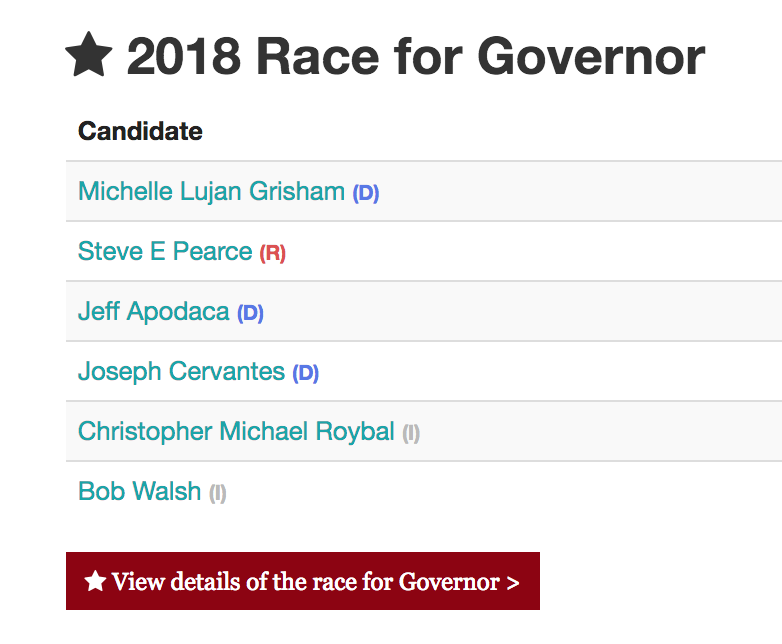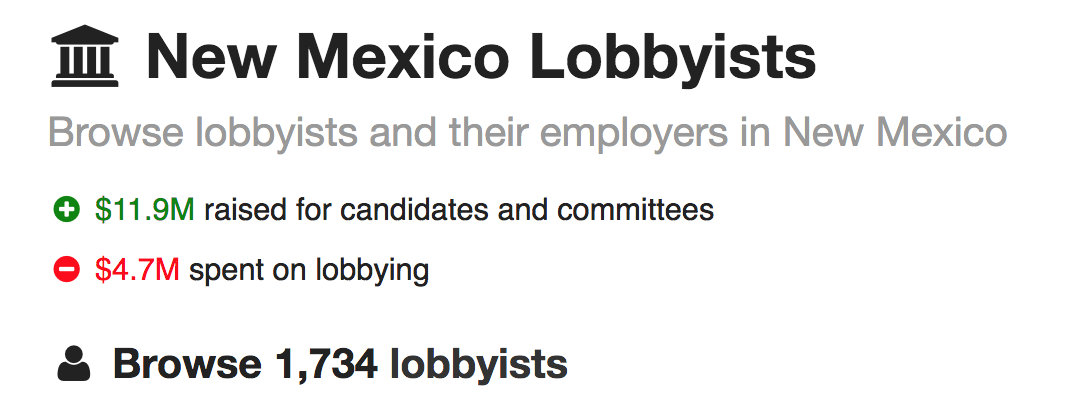About
It can be tough to figure out how money influences our government as it flows through the New Mexico political process.
That’s because information about money and gifts showered on politicians and elected officials is largely found in spreadsheets with tens of thousands of data points.
One of our jobs as journalists is to make sense of the data, so that it informs our reporting on the political and governance process.
But we also think it’s super important for the public to be able to do their own investigation. That’s what the Openness Project is about.
This website contains robust visualizations and highly searchable and interconnected content designed to help you understand who's raising the most money and where that money is coming from at the state and county level (search FEC data to follow the money in the U.S. congressional races). The site is designed to help you follow the money. Columns can be ordered from high to low, the search bar will help you find people and organizations, and you’ll find content on every page that links to other relevant pages of the site.
Originally produced in 2016, we’ve revamped the Openness Project just in time for the 2018 elections. This year will bring the state a new governor. And there are a couple more statewide offices that are wide open as well. State legislators are running, and there are a host of county elections. We've included them all, organized by race:
There's also a new lobbyist portal.
What’s the connection? Lobbyists and their employers are required to file their own public reports with the Secretary of State detailing the money they’ve spent on elected officials and candidates for office. Lobbyists give campaign contributions – a lot of them. And they spend money taking elected officials out to dinner, throwing big events for them, and giving them gifts.
Want to see what a lobbyist or their employer is up to? Search for them by name, or find them in the lobbyist portal:
Share your thoughts.
New Mexico In Depth would very much like to hear what you think would improve this project. We’d also like to know what you find through searching the site, that might lead to a reported story.
Please give us tips or suggested improvements here: Tips or Suggestions. Don’t be shy!
About the Data
The Openness Project is an open source product of New Mexico In Depth, utilizing the services of civic technology company Datamade to build and maintain the site.
The data comes directly from reports submitted to the New Mexico Secretary of State. We greatly appreciate the assistance of Secretary of State staff in helping us acquire the data tables. Because producing the tables requires a separate export process, there are occasionally discrepanices between the data stored here and the data as published on the SOS data portal. If you notice a discrepancy, please let us know so we can look into it.
You can see when the latest update was made in the footer of the website. The site is updated as soon as possible after each official reporting period, but can take up to a week or so to fully update.
How we determined how to group campaigns by “race”:
 Campaigns aren't grouped by race in the data we receive from the Secretary of State. So, in creating them, we consider two campaigns to be in the same race if they share:
Campaigns aren't grouped by race in the data we receive from the Secretary of State. So, in creating them, we consider two campaigns to be in the same race if they share:
These rules for inferring races work pretty well, but it's not perfect. If you notice something wrong, let us know!
Data Downloads:
The data spreadsheets offered for download might look slightly different from what you can download from the SOS data portal. There might be different columns, for instance. That’s because the data gets exported from their database to spreadsheets, which are then imported into Datamade’s database. From that database, Openness Project spreadsheets are generated for users to download. The process works well, but if you notice discrepancies, please let us know so we can take a look at it.
Some basic campaign finance rules
Who has to report?
Candidates must register with the NM SOS and report their fundraising and spending when it exceeds $1,000. PACs must file reports when they raise or spend more than $500. And a new rule requires other organizations that make political expenditures to disclose their spending as well.
What are the contribution limits?
Contribution limits increase gradually over time. Corporations, unions and individuals are allowed to contribute to both candidates and political action committees.
Limits for 2018 races are:
|
From an individual |
From a PAC |
|
|---|---|---|
|
To a Non-Statewide Candidate |
$2,500 |
$5,500 |
|
To a Statewide Candidate |
$5,500 |
$5,500 |
|
To a PAC |
$5,500 |
$5,500 |
When do candidates and PACs have to file?
Filing dates for 2018 are here.
What about super PACs?
Under the 2010 U.S. Supreme Court decision in Citizens United, super PACs may receive unlimited amounts of cash. But they aren’t supposed to coordinate their activities with candidates or political parties.
Super PACs must follow the same reporting schedules as candidates and other PACs.
Super PAC money is typically spent on “independent expenditures,” from TV ads to robocalls to polling to those fliers you get in the mail. But New Mexico doesn’t require super PACs to disclose what races they made those independent expenditures in.
Other resources
New Mexico In Depth's Money in Politics reporting
New Mexico Campaign Reporting Act (PDF)
NM SOS Campaign Finance Information System
Do you have Campaign Finance tips or suggestions for how we can better follow the money in politics?
Email us at marjorie@nmindepth.com
Receive our reporting directly in your email inbox.
And follow us on Facebook or Twitter.


